The Greatest Germany: The Formation of the Pan-Germanic Union, 1836-1936
- Thread starter The B
- Start date
-
We have updated our Community Code of Conduct. Please read through the new rules for the forum that are an integral part of Paradox Interactive’s User Agreement.
You are using an out of date browser. It may not display this or other websites correctly.
You should upgrade or use an alternative browser.
You should upgrade or use an alternative browser.
Sorry for all the broken images. I'm slightly irritated with Photobucket because they have changed all their links for no reason, and then have messed the order up so it takes me forever to fix them.
Anyway, thank you for the feedback. It's what drives an AAR on!
Anyway, thank you for the feedback. It's what drives an AAR on!
IV - Hungarian Freedom
1848-1850
The war for Hungarian freedom was not going well for the defenders. Although Vienna was less than thirty miles from the declared Hungarian border, the hastily assembled troops had failed to take advantage of this. Austrian troops were quick to take the offensive and were hastily pushing in Hungarian territory, with Bratislava quickly falling and Buda-Pest looking ever more in danger.
Prussia was forced to deal with some internal issues, however. In early May a mob of luddites rose in Berlin and the rioting quickly spread across the country.

Prussian troops were called in to deal with the troublemakers, who were gradually dispersed. By late June the problem was over and the ringleaders dealt with, most people agreeing it was a one-off that was unlikely to be repeated.
Two problems were now stopping Prussia from intervening in Hungary; Hungarian suspicion and trouble in the Balkans. The former was caused by a sceptical Hungarian government who were suspicious of Prussia's real motives in the war, and whether they had other plans for Hungary after it had ended. The latter came in July when Montenegro, a Prussian ally for some time, fell out with the Ottoman Empire.
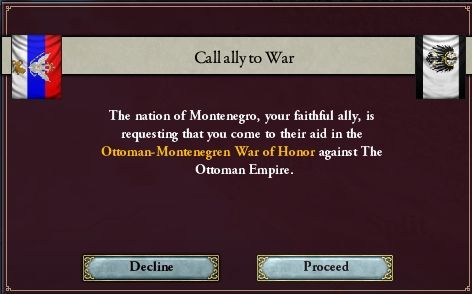
The entire matter had escalated unproportionally, but Prussia felt the need to assist the tiny nation.
Ironically, Prussian troops could not cross the border to fight the Turks, so the only way to help would be war with Austria or somehow demanding military access.
Hungary's pride finally gave way in August and they requested that Prussia assist them.
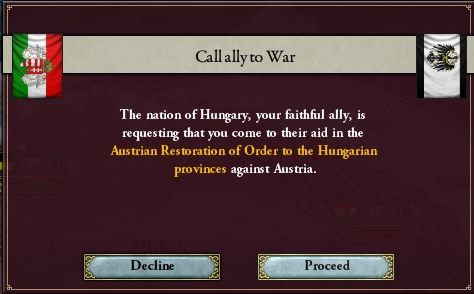
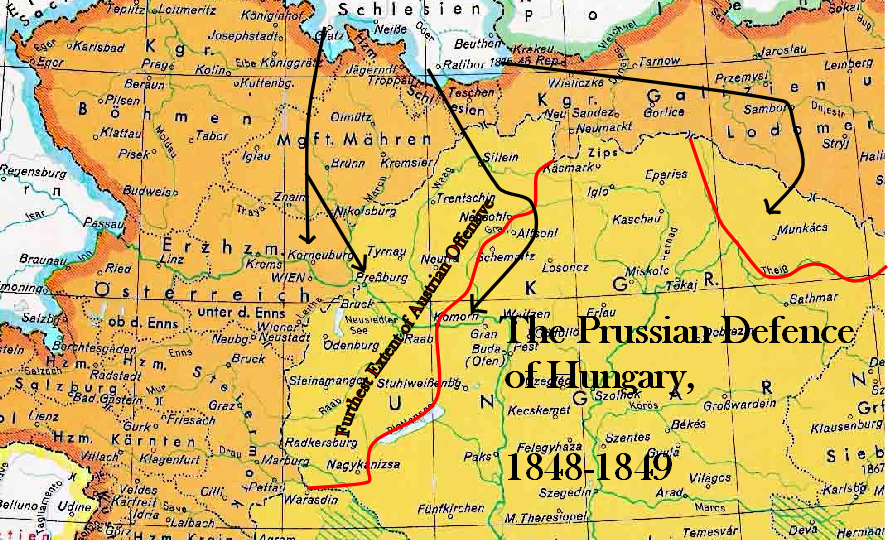
Immediately after mobilising, Prussian troops were forced to engage with the enemy, starting in Trencin.
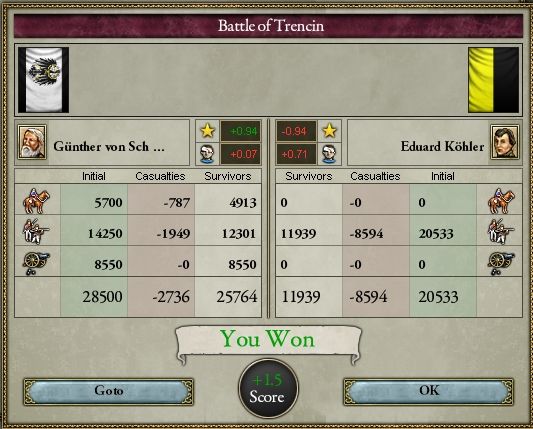
The battle was a morale-raiser for the army, but was completely overshadowed by the shocking defeat of a sizeable Prussian division at the hands of the Ottomans, on German soil. This was thankfully countered by a larger army under the leadership of Alexander von Hohenzollern the following day. The Ottomans would later create havoc in the Prussian countryside around Silesia, before finally being pushed out early the next year.
Things also improved for Hungary by this time as the war quickly turned in their favour, with Prussian troops storming over the border to Vienna. On May 18th Ottoman troops finally surrendered in Montenegro and the war turned to one front. However, local uprising in Lombardia brought international pressure on Prussia to free them as well. This dragged on the war even more, although an end was in sight - in mid July Austrian leaders met with Prussian generals in occupied Vienna to try to work out a peace treaty. Their initial proposal was white peace, effectively recognising Hungary as independent, but this was dismissed as by this time a large quantity of Prussia's resources had been dedicated to the war. A more favourable treaty was needed.
When another call to war came the following September, this time from Schleswig-Holstein, Prussia accepted. Austrian troops had diminished to small, leaderless groups who were essentially on the same level as guerrilla soldiers, making war a simple job of slow occupation
Finally, by April, the lengthy peace negotiations ended. Austria agreed to recognise the independence of Hungary, release Lombardia, and recognise Prussia's hegemony over the south German states - something it had not stuck to in the past.
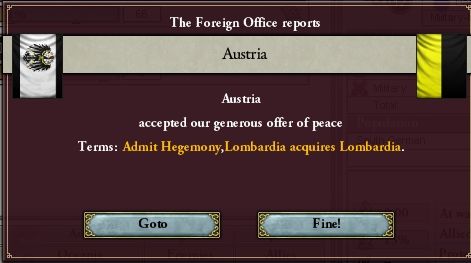
And, two months later, Denmark also surrendered and withdrew troops from foreign territory.
As Prussia signed an alliance with Hungary, Austria had been severely crippled not just by losing a large part of its empire, but also because it now could no longer carry out aggressive expansion in the Balkans without contemplating war with other countries. It's expansionist days were over. And, in as a seemingly illogical outcome a relatively new movement to the area began to surface on the streets of Vienna: pan-Germanism.
1848-1850
The war for Hungarian freedom was not going well for the defenders. Although Vienna was less than thirty miles from the declared Hungarian border, the hastily assembled troops had failed to take advantage of this. Austrian troops were quick to take the offensive and were hastily pushing in Hungarian territory, with Bratislava quickly falling and Buda-Pest looking ever more in danger.
Prussia was forced to deal with some internal issues, however. In early May a mob of luddites rose in Berlin and the rioting quickly spread across the country.

Prussian troops were called in to deal with the troublemakers, who were gradually dispersed. By late June the problem was over and the ringleaders dealt with, most people agreeing it was a one-off that was unlikely to be repeated.
Two problems were now stopping Prussia from intervening in Hungary; Hungarian suspicion and trouble in the Balkans. The former was caused by a sceptical Hungarian government who were suspicious of Prussia's real motives in the war, and whether they had other plans for Hungary after it had ended. The latter came in July when Montenegro, a Prussian ally for some time, fell out with the Ottoman Empire.

The entire matter had escalated unproportionally, but Prussia felt the need to assist the tiny nation.
Ironically, Prussian troops could not cross the border to fight the Turks, so the only way to help would be war with Austria or somehow demanding military access.
Hungary's pride finally gave way in August and they requested that Prussia assist them.


Immediately after mobilising, Prussian troops were forced to engage with the enemy, starting in Trencin.

The battle was a morale-raiser for the army, but was completely overshadowed by the shocking defeat of a sizeable Prussian division at the hands of the Ottomans, on German soil. This was thankfully countered by a larger army under the leadership of Alexander von Hohenzollern the following day. The Ottomans would later create havoc in the Prussian countryside around Silesia, before finally being pushed out early the next year.
Things also improved for Hungary by this time as the war quickly turned in their favour, with Prussian troops storming over the border to Vienna. On May 18th Ottoman troops finally surrendered in Montenegro and the war turned to one front. However, local uprising in Lombardia brought international pressure on Prussia to free them as well. This dragged on the war even more, although an end was in sight - in mid July Austrian leaders met with Prussian generals in occupied Vienna to try to work out a peace treaty. Their initial proposal was white peace, effectively recognising Hungary as independent, but this was dismissed as by this time a large quantity of Prussia's resources had been dedicated to the war. A more favourable treaty was needed.
When another call to war came the following September, this time from Schleswig-Holstein, Prussia accepted. Austrian troops had diminished to small, leaderless groups who were essentially on the same level as guerrilla soldiers, making war a simple job of slow occupation
Finally, by April, the lengthy peace negotiations ended. Austria agreed to recognise the independence of Hungary, release Lombardia, and recognise Prussia's hegemony over the south German states - something it had not stuck to in the past.

And, two months later, Denmark also surrendered and withdrew troops from foreign territory.
As Prussia signed an alliance with Hungary, Austria had been severely crippled not just by losing a large part of its empire, but also because it now could no longer carry out aggressive expansion in the Balkans without contemplating war with other countries. It's expansionist days were over. And, in as a seemingly illogical outcome a relatively new movement to the area began to surface on the streets of Vienna: pan-Germanism.
Interestingly, the definite of 'hegemony' on my iPad is 'Germany was united under Prussian hegemony in 1871.' Just thought I'd share that.
Good to see another update - I've never seen the 'Admit Hegemony' War Goal before. What does it entail?
Good to see another update - I've never seen the 'Admit Hegemony' War Goal before. What does it entail?
Good to see another update - I've never seen the 'Admit Hegemony' War Goal before. What does it entail?
It's valid between great powers of the same cultural group, and when it is enforced, the countries inside the loser's sphere that belong to the common cultural group (German in this case) get transferred to the victor's sphere. It makes forming Germany substantially easier.
Hi to anybody who is following this,
I'm intrigued by the release of Heart of Darkness. It certainly adds some realism. I'm not sure if I should wait and try a restart, or carry on. I've been using my "semi-cheating" excuse to forge more realistic peace terms like in HOD. What do you chaps think? If not, I'm ready to carry on.
I'm intrigued by the release of Heart of Darkness. It certainly adds some realism. I'm not sure if I should wait and try a restart, or carry on. I've been using my "semi-cheating" excuse to forge more realistic peace terms like in HOD. What do you chaps think? If not, I'm ready to carry on.
Considering I'd thought this abandoned, I'd be more than happy to see this continued with HoD. Restarting may be interesting, if it wouldn't be too much of a problem for you. What's here do far is really nice, and I'm glad to see it'll be continued.
Thank you for your comments. This AAR is certainly not dead, it is just due to horrible reality that I haven't been able to do much recently. Unfortunately I don't think I'll be able to do a HOD version anymore, but this will continue.
Update will be up soon! My computer just turned off, but luckily Chrome saved what I was writing. I love you Chrome!
V - Unity, Reform and Anarchy
1850-1855

In August of that year, a new successor state to Prussia finally emerged after months of negotiating and preparing. Called the North German Confederation, it would have a new parliament - the Reichstag - and consist of all the north German states. It was a monumental occasion and considered the beginning of the de jure unification of modern Germany. But, as crowds assembled in the streets singing Deutschlandlied and various other unofficial anthems, there were other states that were less enthusiastic. France immediately expressed disapproval of the union, along with Russia. Both began fortifying their borders - Germany was becoming too aggressive for their liking. France, however, would have to postpone such action the following year due to a revolution. Austria was too weak to resist or influence any action - and trying to do so would have caused discontent amongst the growing pro-German populace. Lastly Britain, a country with cordial relations with the Germans, was cautious but optimistic that the two rising countries would not clash, especially over the currently British island of Heligoland.
Shortly afterwards, the Schleswig-Holstein question was finally resolved (by one of the three people who understood it) after the King of Denmark renounced his claims on the area, the Confederation's first major political victory.
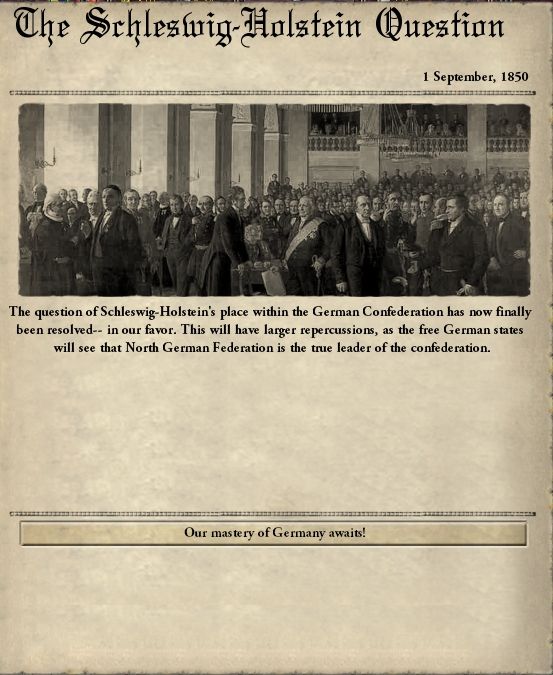
In 1851, Helmuth von Moltke was appointed Chief of the German General Staff. His reforms would change the German army and make it the most feared in Europe - if not the world.

von Moltke
One of his most dramatic reforms was the restructuring of the German Army into different korps. The most skilled soldiers, or those that would be needed in a large specialised group, would be sorted together. The general soldiers would then be put into regional korps, each with at least an infantry, cavalry and artillery unit.
However, during this time of reform a group were noting the lack of organisation the army had during the restructuring. Taking advantage of this, small localised jacobin uprisings would create havoc across the country, culminating in a widespread rebellion in the autumn of 1852. Many hundreds of soldiers were killed before the uprising was finally put down in December.
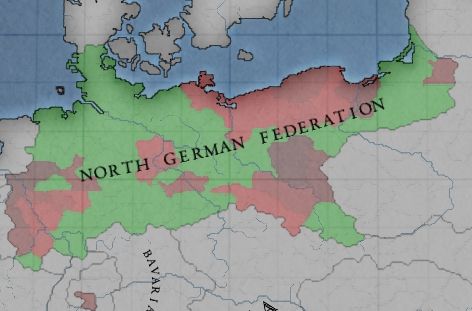
Government map showing rebel activity across the Confederation, January 1852
Austria successfully managed to isolate itself even more the following year to the entirety of Europe by annexing Krakow. This caused a crisis that almost led to war between North Germany and Austria (the former threatening to tear up the earlier peace treaty), but the issue was defused. For reasons not yet known to Austria, this would be fundamental to the final downfall in her last few years. More presently, it led to Bavaria officially condemning the violence and requesting an alliance with North Germany, a very symbolic step for the already economically entwined countries.
A second crisis to hit the country would be much more threatening. In October of 1854 a series of nationalist riots spread across Croatia. Hungary, along with several other countries, pressured Austria to give the area at least some autonomy. The Austrians would have none of it, crushing the uprising and silencing Hungary. But, against the advice of the Germans, Hungary declared war in early December, countered by France who sided with Austria.
The Germans were furious at Hungary's stupidity, as they knew very well that their main ally had a truce with the Austrians that, if broken, would lead to an outcry amongst the Great Powers. But, after examining the situation, they found that Hungary had sufficient troops to fend off the Austrian army if the French could be defeated. War with France had been anticipated for years and this would be an ideal, albeit early, chance to capture the disputed Alsace-Lorraine and once and for all decide who was the dominant force in western Europe. But the army was underprepared for such a war, which could devastate von Moltke's new reformed structure.
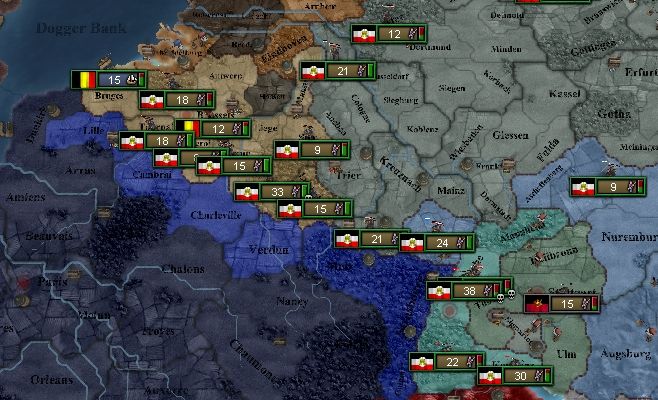
Strategic map of the accumulation of German troops on the border with France, May 1855.
It was almost certain, unless Hungary could shake off the French and Austrian invaders, that the war feared by many would at last be coming to Europe, with consequences for all involved.
1850-1855

In August of that year, a new successor state to Prussia finally emerged after months of negotiating and preparing. Called the North German Confederation, it would have a new parliament - the Reichstag - and consist of all the north German states. It was a monumental occasion and considered the beginning of the de jure unification of modern Germany. But, as crowds assembled in the streets singing Deutschlandlied and various other unofficial anthems, there were other states that were less enthusiastic. France immediately expressed disapproval of the union, along with Russia. Both began fortifying their borders - Germany was becoming too aggressive for their liking. France, however, would have to postpone such action the following year due to a revolution. Austria was too weak to resist or influence any action - and trying to do so would have caused discontent amongst the growing pro-German populace. Lastly Britain, a country with cordial relations with the Germans, was cautious but optimistic that the two rising countries would not clash, especially over the currently British island of Heligoland.
Shortly afterwards, the Schleswig-Holstein question was finally resolved (by one of the three people who understood it) after the King of Denmark renounced his claims on the area, the Confederation's first major political victory.

In 1851, Helmuth von Moltke was appointed Chief of the German General Staff. His reforms would change the German army and make it the most feared in Europe - if not the world.

von Moltke
One of his most dramatic reforms was the restructuring of the German Army into different korps. The most skilled soldiers, or those that would be needed in a large specialised group, would be sorted together. The general soldiers would then be put into regional korps, each with at least an infantry, cavalry and artillery unit.
However, during this time of reform a group were noting the lack of organisation the army had during the restructuring. Taking advantage of this, small localised jacobin uprisings would create havoc across the country, culminating in a widespread rebellion in the autumn of 1852. Many hundreds of soldiers were killed before the uprising was finally put down in December.

Government map showing rebel activity across the Confederation, January 1852
Austria successfully managed to isolate itself even more the following year to the entirety of Europe by annexing Krakow. This caused a crisis that almost led to war between North Germany and Austria (the former threatening to tear up the earlier peace treaty), but the issue was defused. For reasons not yet known to Austria, this would be fundamental to the final downfall in her last few years. More presently, it led to Bavaria officially condemning the violence and requesting an alliance with North Germany, a very symbolic step for the already economically entwined countries.
A second crisis to hit the country would be much more threatening. In October of 1854 a series of nationalist riots spread across Croatia. Hungary, along with several other countries, pressured Austria to give the area at least some autonomy. The Austrians would have none of it, crushing the uprising and silencing Hungary. But, against the advice of the Germans, Hungary declared war in early December, countered by France who sided with Austria.
The Germans were furious at Hungary's stupidity, as they knew very well that their main ally had a truce with the Austrians that, if broken, would lead to an outcry amongst the Great Powers. But, after examining the situation, they found that Hungary had sufficient troops to fend off the Austrian army if the French could be defeated. War with France had been anticipated for years and this would be an ideal, albeit early, chance to capture the disputed Alsace-Lorraine and once and for all decide who was the dominant force in western Europe. But the army was underprepared for such a war, which could devastate von Moltke's new reformed structure.

Strategic map of the accumulation of German troops on the border with France, May 1855.
It was almost certain, unless Hungary could shake off the French and Austrian invaders, that the war feared by many would at last be coming to Europe, with consequences for all involved.
Last edited:
Wonderful - or should that be Wunderbar! Really nice to see another update - it was as well written and presented as pre-hiatus. Long may it continue!
Looking forward to more.
Looking forward to more.
Thank you all for your comments! I've realised that I have made a mistake with the truce date (I mixed up my screenshots). The truce ends the next year. I hope will not this disappoint you, I had totally forgotten - but war will go on in the west, as anticipated. This was where the work needed to be done as Hungary could fend off the Austrian troops on their own easily.
Last edited:
This is a well written AAR and I read through all the updates in one sitting. I'm glad to see that you're continuing this, and I'm following.
VI - The Franco-Prussian War
1855-1856
On May 15th, the declaration of war to France was signed, the reason cited as "occupation of German lands... and irresponsible warmongering in lesser nations." This would in the future be pointed as ironic by French historians but, as a later German Chancellor would say: "Nobody asked the French for their opinion."
France accepted the declaration, bringing their allies the Netherlands, the Papal States - and Switzerland. This was a large shock which angered many German politicians - Switzerland was a neutral state and their constitution barred their troops from serving abroad. It was not clear what their motives were, but it was emphasised that they had exposed themselves to the consequences of losing a war.
Nethertheless, the French were not completely prepared for a war either. It would take twelve days for a French army to defend against the German advance, the first being thoroughly defeated in Cambrai.
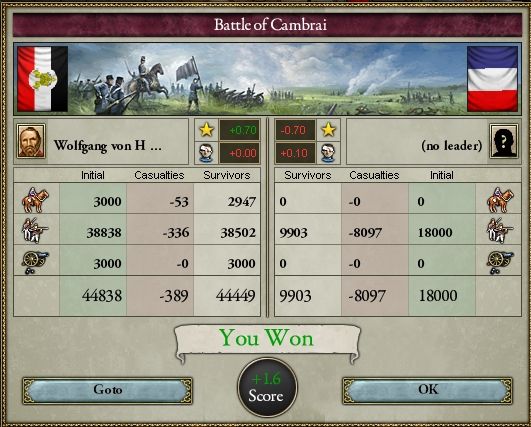
The Dutch, being more confident and relying on eventual French support, launched an offensive into Münster, overwhelming the smaller German army there before reinforcements arrived and they too were repulsed. This coupled with further German advances in France began to quickly erode the French idea of fighting the war on German soil. Generals in the French army began to panic; this was not right. The Germans were supposed be scared of the French, not the opposite.

French soldiers on the outskirts of Metz, days before the military withdraw from the city
By early June the Germans were advancing deep into the French countryside. In Switzerland, street fighting had broken out in Basel and Zurich.
But it seemed, for the French, that the tide may be turning, with the arrival of over 100,000 troops around the city of Épinal. The German advance was forced to halt as they simply lacked the numbers to take on this force. The front in Switzerland stalled as the German army was decisively beaten in the Battle of Hochdorf, outside Lucerne, with considerable losses. Now it was the Germans' time to panic.
The Dutch, without the protection of a large army or mountain range, were struggling. Here the Bavarian army was making the largest contribution, meaning that by early July the only Dutch forces lay inside the capital, awaiting the imminent siege. Soon more troops would be available on the southern fronts. But this did not mean that the Germans felt any safer.
On July 29th, the German military received reports of large forces moving towards their positions. But, as the day progressed, something strange began to emerge - there were not one but two masses of troops, going in separate directions. The Germans realised that the French army had split up - their first major mistake, as the Germans were now able to take each force head on.
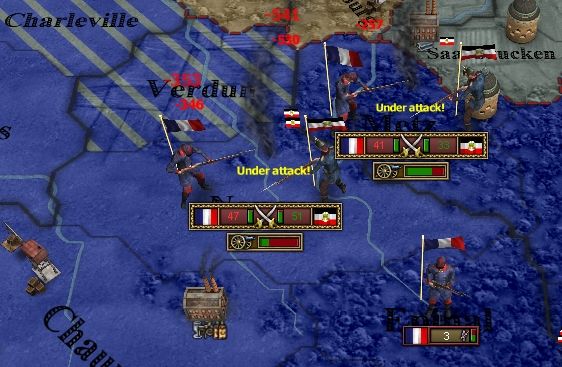
The critical error
The dreadful defeat of both groups of the French reinforcements meant the road to Paris was now wide open for the Sachsen and several Korps under the leadership of Wolfgang von Hohenzollern. This came as a major morale-blow shook the French with the capitulation of the Dutch army in Amsterdam, their most calamitous battle of the war and one that signified the second major turn of fortunes. Two days later, the French signed a white peace with Hungary. Lombardian troops also met the Prussians and Bavarians in Switzerland, arriving from the south and splitting the Swiss army in two.
On December 9th, the garrison of Paris surrendered to the Prussian army besieging the city and the French government immediately sent an offer of Alsace-Lorraine in return for peace. But this was not enough for the German alliance and they immediately counter-demanded the liberation of Lorraine as well, to the west of the soon-to-be German territory. This demand was turned down but the chance of any further French resistance was being chipped away as the Netherlands agreed to a white peace in December. Their last hope rested in a large army to the south, slowly marching to meet the Germans.
But it was not to be. The German generals devised a plan to prevent a conflict with this immense force (for attacking it would be a bloodbath regardless of the victor). Encircling it, as soon as the army began to move they would march their more numerous troops to threaten it, meaning that the French generals could risk attacking or starve. Threatened by potential mutinies and low morale, the French sued for peace on May 2nd.
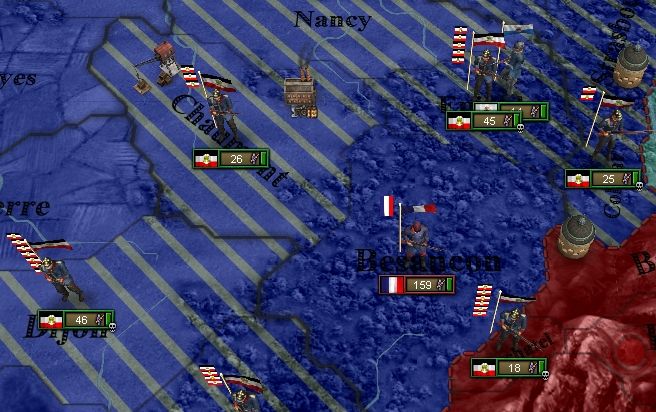
The encirclement
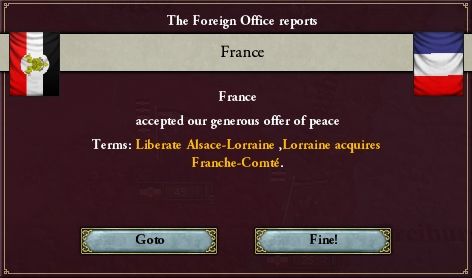
And a devastating peace it was. As well as annexing Alsace-Lorraine, the German alliance created a new buffer state called Lorraine, with a capital in Nancy. It was not really the full Lorraine (considering the traditional Lorrainian capital rested in Metz, rather than the more populous Nancy) but following a recent nationalist sentiment there, the people of Lorraine were happy to have a country.
As well as this, the formerly Prussian territory of Neuenburg (Neuchâtel) was returned.
France lay in ruins, Germany now the masters of western Europe. But there was one more action the Germans would have to take before they could form their much anticipated united Germany.

In this painting by Pierre Puvis de Chavannes a woman holds up an oak twig as a symbol of hope for the nation's recovery from war and deprivation after the Franco–Prussian War.
1855-1856
On May 15th, the declaration of war to France was signed, the reason cited as "occupation of German lands... and irresponsible warmongering in lesser nations." This would in the future be pointed as ironic by French historians but, as a later German Chancellor would say: "Nobody asked the French for their opinion."
France accepted the declaration, bringing their allies the Netherlands, the Papal States - and Switzerland. This was a large shock which angered many German politicians - Switzerland was a neutral state and their constitution barred their troops from serving abroad. It was not clear what their motives were, but it was emphasised that they had exposed themselves to the consequences of losing a war.
Nethertheless, the French were not completely prepared for a war either. It would take twelve days for a French army to defend against the German advance, the first being thoroughly defeated in Cambrai.

The Dutch, being more confident and relying on eventual French support, launched an offensive into Münster, overwhelming the smaller German army there before reinforcements arrived and they too were repulsed. This coupled with further German advances in France began to quickly erode the French idea of fighting the war on German soil. Generals in the French army began to panic; this was not right. The Germans were supposed be scared of the French, not the opposite.

French soldiers on the outskirts of Metz, days before the military withdraw from the city
By early June the Germans were advancing deep into the French countryside. In Switzerland, street fighting had broken out in Basel and Zurich.
But it seemed, for the French, that the tide may be turning, with the arrival of over 100,000 troops around the city of Épinal. The German advance was forced to halt as they simply lacked the numbers to take on this force. The front in Switzerland stalled as the German army was decisively beaten in the Battle of Hochdorf, outside Lucerne, with considerable losses. Now it was the Germans' time to panic.
The Dutch, without the protection of a large army or mountain range, were struggling. Here the Bavarian army was making the largest contribution, meaning that by early July the only Dutch forces lay inside the capital, awaiting the imminent siege. Soon more troops would be available on the southern fronts. But this did not mean that the Germans felt any safer.
On July 29th, the German military received reports of large forces moving towards their positions. But, as the day progressed, something strange began to emerge - there were not one but two masses of troops, going in separate directions. The Germans realised that the French army had split up - their first major mistake, as the Germans were now able to take each force head on.

The critical error
The dreadful defeat of both groups of the French reinforcements meant the road to Paris was now wide open for the Sachsen and several Korps under the leadership of Wolfgang von Hohenzollern. This came as a major morale-blow shook the French with the capitulation of the Dutch army in Amsterdam, their most calamitous battle of the war and one that signified the second major turn of fortunes. Two days later, the French signed a white peace with Hungary. Lombardian troops also met the Prussians and Bavarians in Switzerland, arriving from the south and splitting the Swiss army in two.
On December 9th, the garrison of Paris surrendered to the Prussian army besieging the city and the French government immediately sent an offer of Alsace-Lorraine in return for peace. But this was not enough for the German alliance and they immediately counter-demanded the liberation of Lorraine as well, to the west of the soon-to-be German territory. This demand was turned down but the chance of any further French resistance was being chipped away as the Netherlands agreed to a white peace in December. Their last hope rested in a large army to the south, slowly marching to meet the Germans.
But it was not to be. The German generals devised a plan to prevent a conflict with this immense force (for attacking it would be a bloodbath regardless of the victor). Encircling it, as soon as the army began to move they would march their more numerous troops to threaten it, meaning that the French generals could risk attacking or starve. Threatened by potential mutinies and low morale, the French sued for peace on May 2nd.

The encirclement

And a devastating peace it was. As well as annexing Alsace-Lorraine, the German alliance created a new buffer state called Lorraine, with a capital in Nancy. It was not really the full Lorraine (considering the traditional Lorrainian capital rested in Metz, rather than the more populous Nancy) but following a recent nationalist sentiment there, the people of Lorraine were happy to have a country.
As well as this, the formerly Prussian territory of Neuenburg (Neuchâtel) was returned.
France lay in ruins, Germany now the masters of western Europe. But there was one more action the Germans would have to take before they could form their much anticipated united Germany.

In this painting by Pierre Puvis de Chavannes a woman holds up an oak twig as a symbol of hope for the nation's recovery from war and deprivation after the Franco–Prussian War.
Last edited:
Thank you for your comments, by the way. I'm sorry for the space between my updates, I've had a few health problems recently (nothing serious!).
Here's something I couldn't really fit into the update:
Initial Prussian war plans, devised several months before the war (they would be changed as the war progressed).
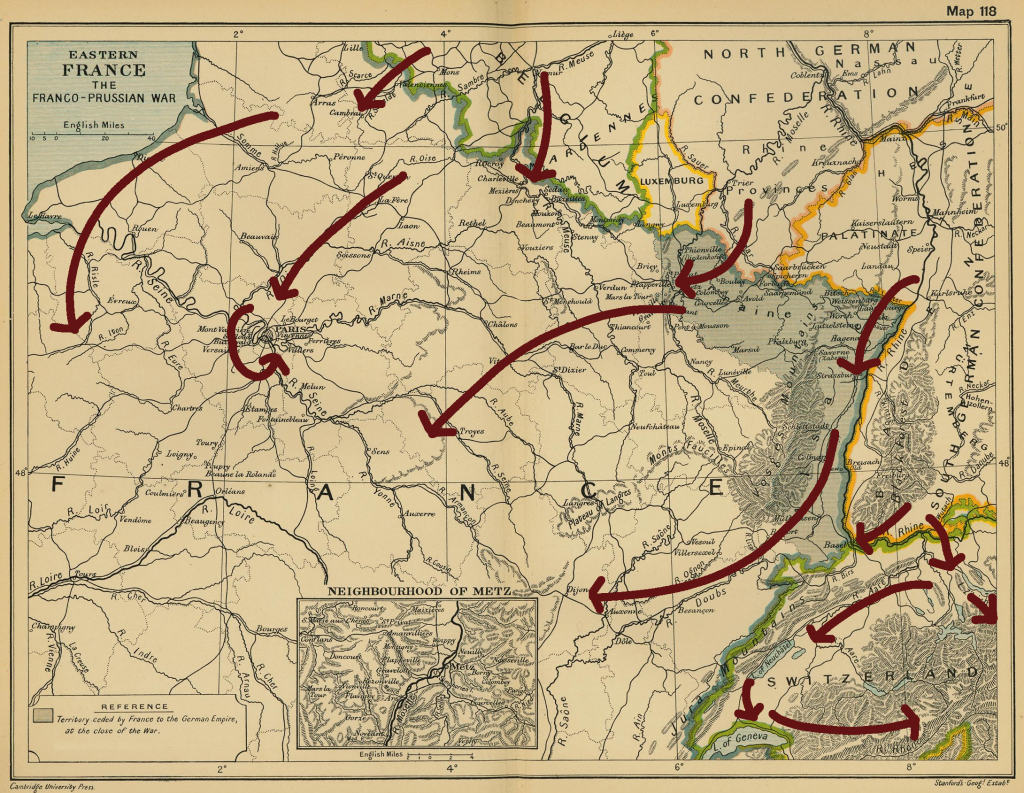
Here's something I couldn't really fit into the update:
Initial Prussian war plans, devised several months before the war (they would be changed as the war progressed).


